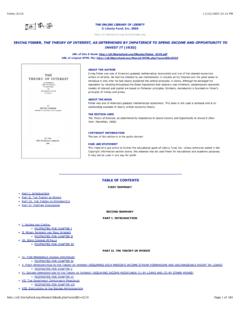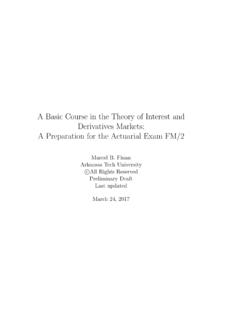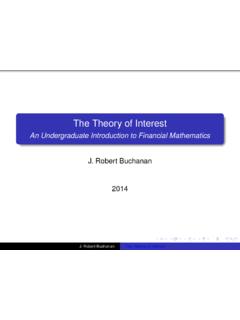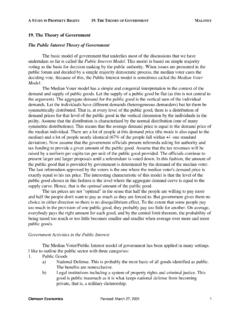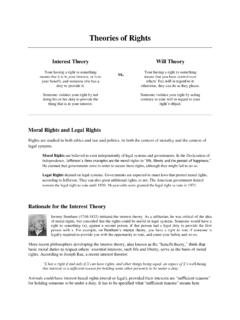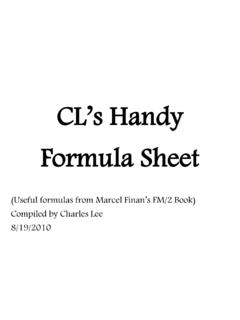Transcription of The General Theory of Employment, Interest, and Money
1 The General Theory of employment , interest , and Money by John Maynard Keynes The General Theory of employment , interest , and Money John Maynard Keynes Table of Contents PREFACE PREFACE TO THE GERMAN EDITION PREFACE TO THE JAPANESE EDITION PREFACE TO THE FRENCH EDITION Book I: Introduction 1. THE General Theory 2. THE POSTULATES OF THE CLASSICAL ECONOMICS 3. THE PRINCIPLE OF EFFECTIVE DEMAND Book II: Definitions and Ideas 4. THE CHOICE OF UNITS 5. EXPECTATION AS DETERMINING OUTPUT AND employment 6.
2 THE DEFINITION OF INCOME, SAVING AND INVESTMENT o APPENDIX ON USER COST 7. THE MEANING OF SAVING AND INVESTMENT FURTHER CONSIDERED Book III: The Propensity to Consume 8. THE PROPENSITY TO CONSUME: I. THE OBJECTIVE FACTORS 9. THE PROPENSITY TO CONSUME: II. THE SUBJECTIVE FACTORS 10. THE MARGINAL PROPENSITY TO CONSUME AND THE MULTIPLIER Book IV: The Inducement to Invest 11. THE MARGINAL EFFICIENCY OF CAPITAL 12. THE STATE OF LONG-TERM EXPECTATION 13. THE General Theory OF THE RATE OF interest 14.
3 THE CLASSICAL Theory OF THE RATE OF interest o APPENDIX ON THE RATE OF interest IN MARSHALL'S PRINCIPLES OF ECONOMICS, RICARDO'S PRINCIPLES OF POLITICAL ECONOMY, AND ELSEWHERE 15. THE PSYCHOLOGICAL AND BUSINESS INCENTIVES TO LIQUIDITY 16. SUNDRY OBSERVATIONS ON THE NATURE OF CAPITAL 17. THE ESSENTIAL PROPERTIES OF interest AND Money 18. THE General Theory OF employment RE-STATED Book V: Money -wages and Prices 19. CHANGES IN Money -WAGES o PROFESSOR PIGOU'S ' Theory OF UNEMPLOYMENT' 20. THE employment FUNCTION 21.
4 THE Theory OF PRICES Short Notes Suggested by the General Theory 22. NOTES ON THE TRADE CYCLE 23. NOTES ON MERCANTILISM, THE USURY LAWS, STAMPED Money AND THEORIES OF UNDER-CONSUMPTION 24. CONCLUDING NOTES ON THE SOCIAL PHILOSOPHY TOWARDS WHICH THE General Theory MIGHT LEAD Appendix 1 Appendix 2 Appendix 3 Rendered into HTML on Wednesday April 16 09:46:33 CST 2003, by Steve Thomas for The University of Adelaide Library Electronic Texts Collection. For offline reading, the complete set of pages is available for download from work is also available as a single file, as PREFACE This book is chiefly addressed to my fellow economists.
5 I hope that it will be intelligible to others. But its main purpose is to deal with difficult questions of Theory , and only in the second place with the applications of this Theory to practice. For if orthodox economics is at fault, the error is to be found not in the superstructure, which has been erected with great care for logical consistency, but in a lack of clearness and of generality in the pre misses. Thus I cannot achieve my object of persuading economists to re-examine critically certain of their basic assumptions except by a highly abstract argument and also by much controversy.
6 I wish there could have been less of the latter. But I have thought it important, not only to explain my own point of view, but also to show in what respects it departs from the prevailing Theory . Those, who are strongly wedded to what I shall call 'the classical Theory ', will fluctuate, I expect, between a belief that I am quite wrong and a belief that I am saying nothing new. It is for others to determine if either of these or the third alternative is right. My controversial passages are aimed at providing some material for an answer; and I must ask forgiveness if, in the pursuit of sharp distinctions, my controversy is itself too keen.
7 I myself held with conviction for many years the theories which I now attack, and I am not, I think, ignorant of their strong points. The matters at issue are of an importance which cannot be exaggerated. But, if my explanations are right, it is my fellow economists, not the General public, whom I must first convince. At this stage of the argument the General public, though welcome at the debate, are only eavesdroppers at an attempt by an economist to bring to an issue the deep divergences of opinion between fellow economists which have for the time being almost destroyed the practical influence of economic Theory , and will, until they are resolved, continue to do so.
8 The relation between this book and my Treatise on Money [JMK vols. v and vi], which I published five years ago, is probably clearer to myself than it will be to others; and what in my own mind is a natural evolution in a line of thought which I have been pursuing for several years, may sometimes strike the reader as a confusing change of view. This difficulty is not made less by certain changes in terminology which I have felt compelled to make. These changes of language I have pointed out in the course of the following pages; but the General relationship between the two books can be expressed briefly as follows.
9 When I began to write my Treatise on Money I was still moving along the traditional lines of regarding the influence of Money as something so to speak separate from the General Theory of supply and demand. When I finished it, I had made some progress towards pushing monetary Theory back to becoming a Theory of output as a whole. But my lack of emancipation from preconceived ideas showed itself in what now seems to me to be the outstanding fault of the theoretical parts of that work (namely, Books III and IV), that I failed to deal thoroughly with the effects of changes in the level of output.
10 My so-called 'fundamental equations were an instantaneous picture taken on the assumption of a given output. They attempted to show how, assuming the given output, forces could develop which involved a profit-disequilibrium, and thus required a change in the level of output. But the dynamic development, as distinct from the instantaneous picture, was left incomplete and extremely confused. This book, on the other hand, has evolved into what is primarily a study of the forces which determine changes in the scale of output and employment as a whole; and, whilst it is found that Money enters into the economic scheme in an essential and peculiar manner, technical monetary detail falls into the background.
